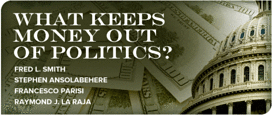Fred L. Smith’s essay “Public Choice and Political Advocacy: A View from the Front Lines” suggests that, contrary to the conventional narrative, only a small amount of money is diverted towards political advocacy. To some readers this may sound like surprisingly good news, while to others this may seem disappointing. In this brief comment, I will suggest that—good or bad as this may be perceived—the fact that only a limited amount of resources are invested in political advocacy is neither surprising nor attributable to a previously underappreciated virtue on the part of businessmen.
Politics-like-markets metaphors have inspired much of the academic thinking in public choice and political economy circles. The use of economic models of competition for the study and understanding of political competition forms an established foundation of much of the work of the Chicago school of political economy, and of the Virginia school of public choice. Stigler (1971), Becker (1983) and Peltzman (1990), among others, have provided the theoretical foundations of the so-called efficiency hypothesis of political markets. On this issue, the Virginia public choice school has offered a more skeptical—and in many ways more realistic—view of political markets, suggesting that in real politics, legislative and political bodies seldom work like traditional markets.
Undoubtedly, competition is an important ingredient of political markets. But a political market can be competitive without necessarily exhibiting the features that we generally associate with the idea of a competitive marketplace. Gordon Tullock’s (1967) seminal article lays the foundations for the understanding of the nature of competition by individuals and groups through the political process. Tullock’s idea was followed by the work of Anne O. Krueger, who coined the term “rent-seeking,” which still stands as the fundamental conceptual framework in economic theory for the study of competitive politics and political advocacy. Rent-seeking models consider how political advocates expend costly efforts to increase their probability of receiving or their share of a given political good. The literature that followed focused on how much effort each political player expends, identifying the main determinants of effort expenditures (e.g., Posner 1975, Demsetz, 1976; Bhagwati, 1982; Tollison, 1982, and many others).
This important literature has shown that the conventional results of competition economics did not have a direct applicability to political markets. In a long-run equilibrium, investments in a competitive market yield the normal market rate of return, but this equilibrium result hardly provides any useful benchmark when considering political markets. The rent-seeking literature unveiled the different nature of political competition, identifying conditions under which competitive political markets could lead to higher or lower returns than long-run market equilibria. This literature is of great practical and theoretical significance for the understanding of political advocacy contests, and to explain some of the apparent contradictions unveiled in Fred L. Smith’s essay.
Gordon Tullock’s (1980) rent-seeking paradox can be used to show that in adversarial political advocacy contests with strong contestants, aggregate political expenditures could exceed the value of the political good that is at stake. This could lead to negative expected returns for the players. If given an exit option, rational players should exit the political advocacy contest. But this would leave valuable political rent opportunities unexploited. This framework can therefore explain the surprisingly low levels of investment in political markets. The apparently discontinuous and erratic participation of players in political advocacy can further be explained by the recent solution of Tullock’s paradox offered by Dari Mattiacci and Parisi (2005). In that paper, Dari Mattiacci and I have shown that when political contestants face increasing returns to effort and players have an exit option (e.g., can choose not to invest in political advocacy, given the high cost and low expected returns from participation), valuable opportunities may occasionally remain unexploited. The unexploited political advocacy opportunities may be puzzling if considered individually, but reflect a fully rational mixed participation strategy. The forgone opportunities of active engagement in political advocacy should be viewed as an additional hidden cost that results from strong political competition, rather than as an indicium of weakened political participation.
References
Bhagwati, Jagdish N. 1982. “Directly Unproductive, Profit-Seeking (DUP) Activities,” 90 Journal of Political Economy 988–1002.
Becker, Gary S. 1983. “A Theory of Competition among Pressure Groups for Political Influence,” 98 Quarterly Journal of Economics 371–400.
Dari-Mattiacci, Giuseppe and Francesco Parisi. 2005. “Rents, Dissipation, and Lost Treasures: Rethinking Tullock’s Paradox,” 124 Public Choice 411–22.
Demsetz, Harold. 1976. “Economics as a Guide to Antitrust Legislation,” 19 Journal of Law and Economics 371–84.
Peltzman, S. 1990. “How Efficient Is the Voting Market?” 33 Journal of Law and Economics 27–63.
Posner, Richard. 1975. “The Social Costs of Monopoly and Regulation,” 83 Journal of Political Economy 807–27.
Stigler, George. 1971. “The Theory of Economic Regulation,” 3 Bell Journal of Economics and Management Science 3–18.
Tollison, Robert D. 1982. “Rent Seeking: A Survey,” 35 Kyklos no. 4:575–602.
Tullock, Gordon. 1967. “The Welfare Costs of Monopolies, Tariffs, and Theft,” 5 Western Economic Journal 224–32.
Tullock, Gordon. 1980. “Efficient Rent-Seeking,” in J.M Buchanan, G. Tollison, and G. Tullock, Toward a Theory of the Rent-Seeking Society. College Station: Texas A&M University Press.

